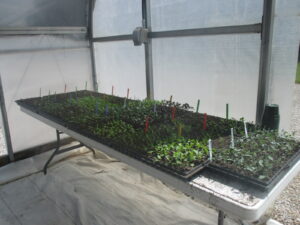As warm-season crops are harvested, many vegetable farmers start the process of transitioning to cool-season crops. Leafy greens and root vegetables are ready to be planted. High temperature is present across the state recently. The heat stress may affect germination and growth of some of the vegetables.
Spinach is probably one of the most heat-sensitive crops in seed germination. Although studies show spinach seeds can germinate at temperatures from 40 to 86° F, optimum germination occurs at approximately 70° F. Germination rate drops abruptly above 75° F. Lettuce seed germination is also heat sensitive. Some cultivars have better heat tolerance than others, but in general, germination rate is reduced with temperatures above 75° F. Seed germination of many leafy greens in the Brassica family such as mustard, pac choi and kale have better heat tolerance in general, and there are cultivars that can grow well under heat. Swiss chard is in the same family as spinach, but it can stand better under high temperatures. If spinach and lettuce have to be planted under the recent heat, it is critical to apply irrigation frequently as a cooling approach, and germinate the seeds under shade if it is possible.
Vegetative growth of Brussel sprouts, cabbage and broccoli can occur under a wide range of temperatures and in general, can grow well under the heat. However, head or sprout formation of these crops is sensitive to heat stress. Seedlings of beet can grow at warmer temperatures, but the roots develop rapidly under heat and become lignified and fibrous. Foliage growth of carrot can tolerate high temperatures, but roots tend to be short and stubby and develop strong flavors.
